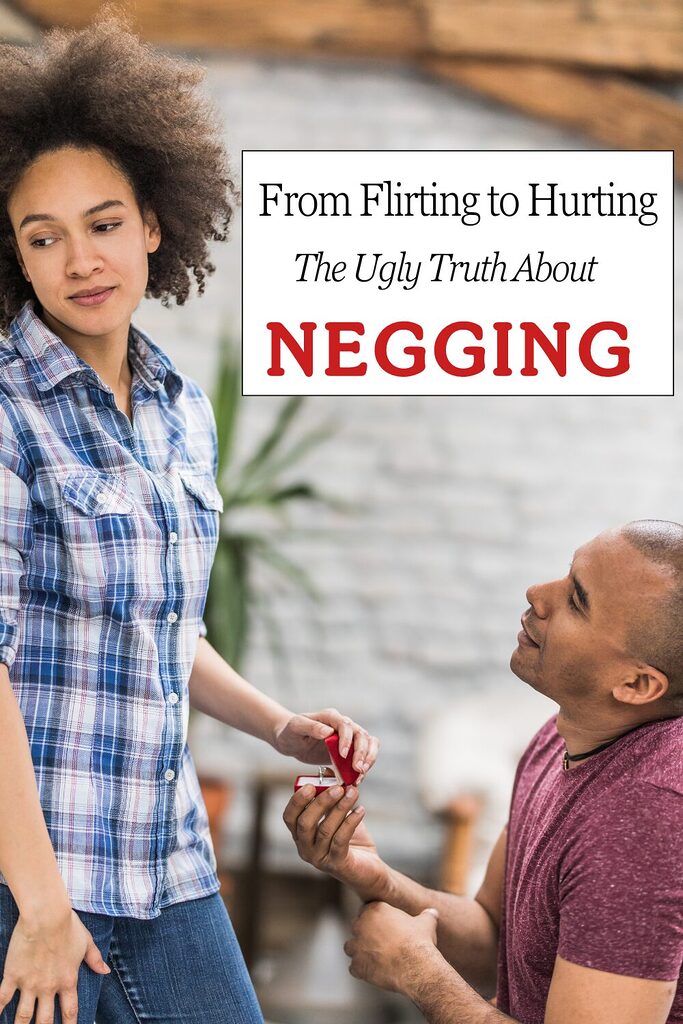Ever been in a conversation where a seemingly innocent compliment left you feeling uneasy or even a bit hurt? You might have encountered negging, a subtle and often confusing form of emotional manipulation.

Negging is more than just an offhand remark; it’s a calculated move designed to undermine your confidence while appearing friendly. Let’s dive into the murky waters of negging and uncover the truth behind this harmful behavior.
What is Negging?
Definition and Origins
Negging, a portmanteau of “negative” and “commenting,” is a tactic used primarily in dating scenarios but can occur in various relationships. It’s a backhanded compliment or a veiled insult meant to lower the recipient’s self-esteem, making them more vulnerable to the manipulator’s influence. This technique gained notoriety through the pickup artist community, where it was touted as a way to make potential partners feel insecure and thus more eager to seek validation.
Negging Examples
The behavior can be subtle or overt. Here are a few examples:
- “You look great for your age.”
- “That dress is nice, but it would look better on someone else.”
- “You’re pretty smart for someone who didn’t go to college.”
These comments seem harmless at first glance but carry a sting that can chip away at one’s confidence over time.
The Psychology Behind Negging
Manipulation Tactics
At its core, this behavior is about power and control. By undermining someone’s self-worth, the negger positions themselves as the source of validation, creating a dependency. This manipulative tactic plays on insecurities and can be particularly effective on those already struggling with self-esteem issues.
The Impact on Self-Esteem
The immediate effect of this tactic is a blow to one’s self-esteem. Over time, repeated exposure to such comments can lead to a persistent feeling of inadequacy. Victims may start doubting their worth and capabilities, making them more susceptible to further manipulation and control.
Recognizing Negging in Different Scenarios
Negging in Romantic Relationships
Early Stages of Dating
Negging is often employed in the early stages of dating to unsettle the target and make them crave approval. For instance, a date might say, “You’re cute, but you’d be hotter if you lost a few pounds.” This not-so-subtle jab can make the recipient feel self-conscious and eager to prove their worth.
Long-Term Relationships
In long-term relationships, negging can manifest as constant criticism masked as concern. Comments like, “I love you, but you’d be perfect if you were more ambitious,” can erode self-esteem and create a dynamic where the negger always holds the upper hand.
Negging Among Friends
This type of emotional manipulation isn’t confined to romantic relationships; it can also appear among friends. A friend might say, “Wow, you actually look good today,” implying that the person usually doesn’t. This type of behavior can create a toxic friendship where one person constantly belittles the other to feel superior.
Negging in the Workplace
In professional settings, this manipulation tactic can undermine colleagues’ confidence and create a hostile work environment. Comments like, “Your presentation was good, but I didn’t expect that from you,” can sow doubt and foster resentment. Recognizing and addressing negging in the workplace is crucial for maintaining a healthy and supportive work culture.
The Emotional Consequences of Negging
Short-Term Effects
The immediate aftermath of emotional manipulation can leave someone feeling confused, hurt, and self-conscious. They might second-guess their appearance, intelligence, or abilities, leading to anxiety and a need for reassurance.
Long-Term Damage
Prolonged exposure to negging can have severe psychological consequences. It can result in chronic low self-esteem, depression, and anxiety. Victims might withdraw from social interactions, fearing further emotional harm. In extreme cases, this can lead to long-term mental health issues that require professional intervention.
How to Respond to Negging
Identifying Negging

The first step in responding to negging is recognizing it for what it is: a form of manipulation. Pay attention to how comments make you feel. If you consistently feel worse about yourself after interacting with someone, it might be a sign that they’re negging you.
Setting Boundaries
Once you’ve identified negging, it’s important to set clear boundaries. Let the negger know that their comments are unacceptable and that you won’t tolerate them. This can be done assertively and respectfully. For example, you might say, “I don’t appreciate comments that make me feel bad about myself.”
Seeking Support
Don’t hesitate to seek support from friends, family, or a mental health professional. Discussing your experiences with someone you trust can provide validation and help you navigate the emotional fallout of negging. A therapist can offer strategies for coping and rebuilding your self-esteem.
Why People Neg Others
Insecurity and Low Self-Esteem
Often, those who engage in negging do so out of their own insecurities. They may feel inadequate and use negging as a way to elevate themselves by putting others down. Understanding this doesn’t excuse the behavior but can offer insight into the underlying motivations.
Desire for Control
Negging can also stem from a desire to control others. By keeping someone off balance and unsure of themselves, the negger can maintain a sense of superiority and control in the relationship. This is a hallmark of toxic and abusive behavior.
The Importance of Healthy Communication
Building Respectful Relationships
Healthy communication is the cornerstone of any respectful relationship. It’s important to engage in open, honest, and supportive dialogue with those around you. Avoiding passive-aggressive comments and instead focusing on constructive feedback can help build stronger, more positive connections.
Encouraging Positive Interactions
Encouraging positive interactions means uplifting and validating others rather than tearing them down. Compliments should be genuine and free of hidden barbs. By fostering an environment of mutual respect and appreciation, we can combat the damaging effects of negging.
Conclusion
Negging is a harmful and manipulative tactic that can have serious emotional consequences. By understanding what negging is and how to recognize it, we can protect ourselves and others from its damaging effects. Setting boundaries, seeking support, and fostering healthy communication are key steps in combating negging.
Remember, everyone deserves to be treated with respect and kindness. If you or someone you know is experiencing problems with negging behavior, seeking professional help can provide the necessary support and strategies to overcome its impact. Let’s strive to build each other up rather than tear each other down.
FAQs
What should I do if I realize I’m being negged?
If you realize you’re being negged, it’s important to set clear boundaries and communicate your feelings to the person. Seek support from trusted friends or a therapist to help navigate the situation.
Can negging happen in platonic relationships?
Yes, negging can occur in any type of relationship, including friendships and professional settings. It’s a form of manipulation that isn’t limited to romantic interactions.
Mental Health Issues in Seniors
As individuals age, they may face various mental health challenges that can significantly impact their overall well-being.
Suicide Prevention and Awareness
Suicide is a global public health issue that affects individuals, families, and communities worldwide. Despite its prevalence, it remains a topic shrouded in stigma and silence.
Veterans’ Mental Health
Overview The mental health challenges faced by veterans often stem from a combination of factors unique to their military service experiences and post-deployment transition to civilian life.
The Impact of Social Media on Mental Health
In today’s digitally connected world, social media has become an integral part of our daily lives, shaping how we communicate, connect, and consume information.




